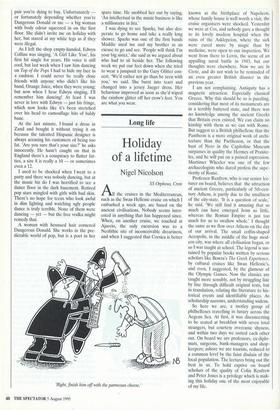Long life
Holiday of a lifetime
Nigel Nicolson
ASS Orpheus, Crete 1 the cruises in the Mediterranean, such as the Swan Hellenic cruise on which I embarked a week ago, are based on the ancient civilisations. Nobody seems inter- ested in anything that has happened since. When, on another cruise, we touched at Ajaccio, the only excursion was to a Neolithic site of inconceivable dreariness, and when I suggested that Corsica is better 'Right, finish him off with the parmesan cheese.' known as the birthplace of Napoleon, whose family house is well worth a visit, the cruise organisers were shocked. Yesterday we were at Cos, and nobody gave a thought to its lovely modern hospital when the ruins of the Asklepeion, where the sick were cured more by magic than by medicine, were open to our inspection. We went from there to Leros, the scene of an appalling naval battle in 1943, but our thoughts were elsewhere. Now we are in Crete, and do not wish to be reminded of an even greater British disaster in the previous year.
I am not complaining. Antiquity has a magnetic attraction. Especially classical Greece. Why this should be so is puzzling, considering that most of its monuments are in a terribly battered state, and there was no knowledge among the ancient Greeks that Britain even existed. We can claim no kinship with them as we can with • Rome. But suggest to a British philhellene that the Pantheon is a more original work of archi- tecture than the Parthenon, or that the bust of Nero in the Capitoline Museum surpasses in quality the Hermes of Praxite- les, and he will put on a pained expression. Mortimer Wheeler was one of the few archaeologists who dared profess the supe- riority of Rome.
Professor Renfrew, who is our senior lec- turer on board, believes that the attraction of ancient Greece, particularly of 5th-cen- tury Athens, is partly due to the smallness of the city-state. 'It is a question of scale,' he said. 'We still find it amazing that so much can have emerged from so little, whereas the Roman Empire is just too much for us to swallow whole.' I thought the same as we flew over Athens on the day of our arrival. The small coffin-shaped Acropolis, in the middle of the huge mod- ern city, was where all civilisation began, or so I was taught at school. The legend is sus- tained by popular books written by serious scholars like Bowra's The Greek Experience, by cultural cruises like Swan Hellenic's, and even, I suggested, by the glamour of the Olympic Games. Now the classics are taught more sensibly, not by struggling line by line through difficult original texts, but in translation, relating the literature to his- torical events and identifiable places. As scholarship narrows, understanding widens.
So here we are, a motley group of philhellenes travelling in luxury across the Aegean Sea. At first, it was disconcerting to be seated at breakfast with seven total strangers, but courtesy overcame shyness, and within two days we sorted each other out. On board we are professors, ex-diplo- mats, surgeons, bank-managers and shop- keepers; ashore we are tourists, reduced to a common level by the faint disdain of the local population. The lectures bring out the best in us. To hold captive on board scholars of the quality of Colin Renfrew and Peter Jones is a privilege which is mak- ing this holiday one of the most enjoyable of my life.


















































 Previous page
Previous page